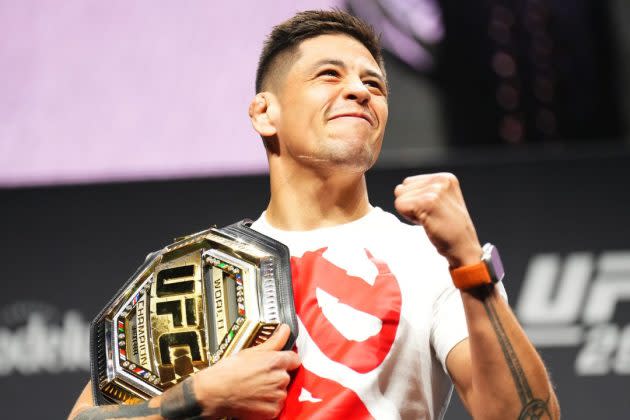UFC 290 Spotlights Mexican Champs as MMA Takes on Boxing Hotbed

UFC 290, taking place Saturday at the T-Mobile Arena in Las Vegas, features two Mexican champions who have the potential to reenergize Mexican American fans domestically while tapping into the growing mixed martial arts craze south of the border.
Featherweight Yair ‘El Pantera’ Rodriguez from Parral, Chihuahua, is headlining the main event in a title clash against Aussie Alexander Volkanovski. UFC flyweight champion Brandon ‘The Assassin Baby’ Moreno from Tijuana will defend his title against Brazilian Alexandre Pantoja. In total, five of the UFC 290 fighters—including Moreno, the first Mexico-born UFC champion—are Mexican athletes, elevating their country into something of a fighting powerhouse.
More from Sportico.com
Sporticast: MMA Giant ONE Championship Makes U.S. Fight Debut
Market Warms to WWE Deal as McMahon's Wealth Jumps $600 Million
The 290 card caps off the promotion’s annual International Fight Week. Top execs at UFC say they aren’t rooting for anyone specific—instead, they are solely looking to execute the best event possible—but they won’t ignore the chance to further capture the hearts of Mexican combat fans.
“When you have champions or people contending for titles, you have to take advantage of those opportunities,” UFC chief operating officer Lawrence Epstein said in a phone interview. “But we have a really long-term mindset with respect to Mexico.
UFC, which boasts 3.2 million social media followers in Mexico, is creating a physical presence in the country by investing in a multi-million health and performance facility in Mexico City, set to open this fall, where promising stars can train, conduct physical therapy and receive nutritional consultations, among other things. UFC sees the Performance Institute, which also has locations in Las Vegas and Shanghai, as the focal point of its long-term strategy in Mexico, as the PI will serve as a training ground to find the next Mexican national star.
UFC eventually hopes to stage more frequent major live events, fan expos and activations in Mexico, building on earlier success it had in the country with previous fights and Ultimate Fighter episodes across Latin America. That effort will be fueled if it can develop local talent, following a similar playbook used at its sister brand WWE. This strategy has proved successful with former stars such as Conor McGregor, who went from a local favorite in Ireland to global superstar—catapulting the UFC into the mainstream.
“You have to find a way to capture the community’s attention, and that’s usually done with local heroes,” former UFC chief content officer Marshall Zelaznik said in an interview. “Somebody from the country that goes on to do great things.”
As the in-market gameplan takes shape in Mexico, UFC wants to keep building with planned live events and activations in the states, including hosting a special fight event headlined by Mexican star Alexa Grasso in Las Vegas on Sept. 16 to celebrate Mexican Independence Day.
Like with other major sports leagues and organizations, the COVID-19 pandemic presented a slight hiccup in international efforts to showcase the brand in-person in Mexico and overseas. UFC hasn’t hosted an event in Mexico since 2019, when interim featherweight champ Rodriguez was a headliner. The company, which has more than 60 athletes from Spanish-speaking countries, plans to stage another event in Mexico sometime next year, pending arena availability. But it wants its presence in the federation to be much more intimate than a few times a year.
UFC parent company Endeavor (NYSE: EDR) as a whole is looking to embrace Mexican fans here and abroad through its other entities too; this is just the latest plan draped in red, white and green for the major holding company. Its other properties, including Professional Bull Riding (PRB), also are engaging with Mexican fans. WWE, which was acquired in a recent $9 billion deal, returns to Mexico in two weeks for the first time since 2019.
“Endeavor is focused on the Mexican market at a variety of levels,” Epstein said. “It’s not just UFC and PBR, but everything they do from an entertainment and content standpoint.”
Mexico presents unique business opportunities with great potential to drive significant content and ticket sales as well as creating fruitful relationships with local partners. The country, which has one of the world’s largest economies, has a deep culture and history tied to combat sports, primarily in boxing.
UFC must also still find its footing within Mexico’s less robust media landscape, which poses challenges as pay-per-view events are subject to lose a chunk of local viewership with many fans used to consumption through free-to-air television. With limited broadcast partners, it can be difficult to secure shelf space on linear TV, competing with popular sports like boxing and soccer.
“You’re competing in a different market with a different media landscape but the tried-and-true way that you can continue to win there is exposure of the product and its fighters,” said Zelaznik, who formerly oversaw UFC’s global expansion. “That’s not just putting the fights on but that’s also with public relation campaigns, marketing and brand associations.”
Epstein says that the UFC shouldn’t be a “zero-sum game” against boxing, pointing out that fan-centric circles overlap, and the appetite for fighting provides upside for the MMA and the UFC, which continues to gain more Hispanic fans. There’s also content crossover opportunity to leverage Mexico’s biggest stars.
Though media markets differ, the boots-on-the-ground strategy in Mexico, with a Latin America-focused facility, has the potential to be a blueprint as the promotion wants to create more content and recruit in other countries like Brazil—which has three fighters on Saturday’s 290 card, including Pantoja.
“The short-term opportunity is right in front of us, but the long-term opportunity is just as exciting,” Epstein said.
Best of Sportico.com
